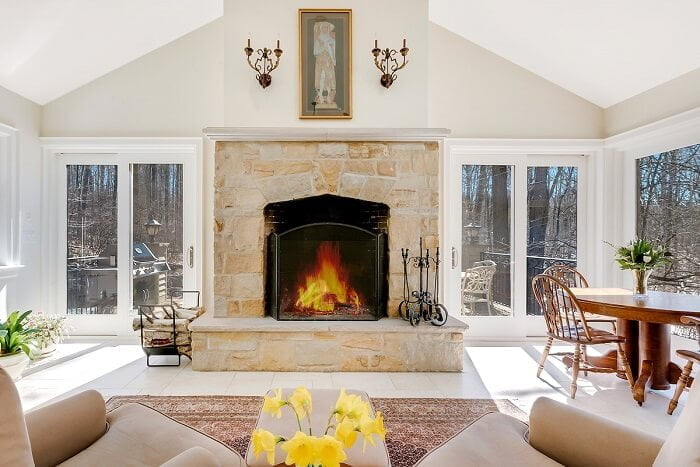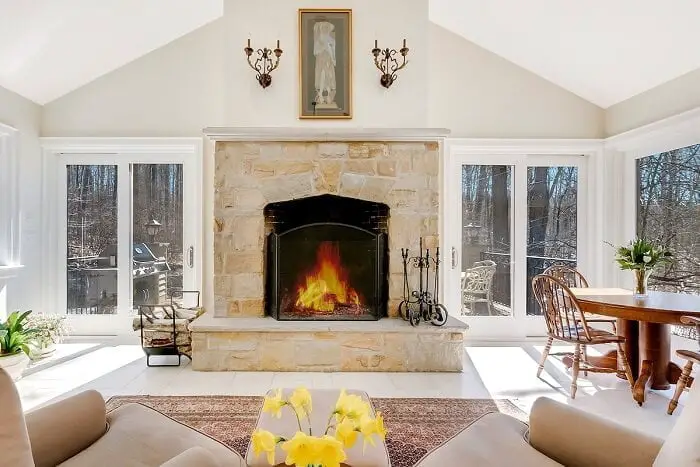Is It Cheaper to Run a Gas Fireplace Than a Furnace?
Disclosure: As an Amazon Associate, I earn from qualifying purchases. Learn more
A gas fireplace is a popular home heating option because it is relatively cheap to operate. In fact, many people believe that a gas fireplace is cheaper to run than a furnace. However, this is not always the case.
The cost of running a gas fireplace depends on a number of factors, including the price of natural gas, the efficiency of the fireplace, and the size of your home.
There are a lot of factors to consider when trying to determine if it is cheaper to run a gas fireplace or a furnace. The first thing you need to consider is the cost of natural gas. In most areas, natural gas is cheaper than electricity, so running a gas fireplace will typically be cheaper than running an electric furnace.
However, there are some areas where electricity is cheaper than natural gas, so you’ll need to do some research on your specific location. Another factor to consider is the efficiency of each type of appliance. Gas fireplaces are usually more efficient than furnaces, so they will tend to use less energy and save you money in the long run.
Finally, you’ll need to think about how often you plan on using each appliance. If you only plan on using your fireplace occasionally, then it might not be worth the investment compared to a furnace that you’ll use every day.
What Uses More Gas Furnace Or Gas Fireplace?
There are a few things to consider when trying to determine whether a gas furnace or fireplace uses more gas. First, you need to know the efficiency of each appliance. A typical gas furnace is about 80% efficient while most fireplaces are only about 50% efficient.
This means that for every 100 BTUs of natural gas burned by the furnace, only 80 BTUs are actually used to heat the home. The other 20 BTUs are lost up the chimney. In contrast, half of the natural gas burned by a fireplace is wasted because it goes up the chimney.
Another factor to consider is how often each appliance is used. If you use your fireplace regularly, it will obviously use more natural gas than if you only use it occasionally. The same goes for furnaces – if you have yours running all day long during the winter, it will use more gas than if you only turn it on for a few hours each day.
So, taking all of this into consideration, which one uses more gas – a furnace or a fireplace? It really depends on several factors but generally speaking, a furnace will use less natural gas than a fireplace because it is more efficient and typically isn’t used as often.
Is It Cheaper to Run a Gas Fireplace Or an Electric Furnace?
If you’re looking to save money on your heating bill, a gas fireplace is the way to go. Electric furnaces are more expensive to operate since they use more electricity. Here’s a breakdown of the costs:
Gas fireplace: -Cost of gas: $0.60 per hour -Operating cost: $0.15 per hour
Total cost: $0.75 per hour Electric furnace: -Cost of electricity: $0.10 per kWh (kilowatt hour)
-Operating cost: $0.05 per kWh
Related Post: Can You Cook Food in a Gas Fireplace or Fire Pit?
Gas Fireplace Monthly Cost
If you’re considering adding a gas fireplace to your home, you may be wondering about the monthly cost. Here’s a look at what you can expect to pay for your gas fireplace, based on different factors. The cost of natural gas is the biggest factor in determining your monthly gas fireplace cost.
The average price of natural gas in the United States is $0.60 per therm, but it can range from $0.40 to $0.80 per therm. So, if you use 1,000 therms of natural gas per month, your monthly cost would be $600 (1,000 x $0.60). In addition to the cost of the natural gas itself, you’ll also have to pay a service fee from your local utility company.
This fee is typically around $5 per month. Finally, if you have a vented gas fireplace, you’ll need to purchase vents and chimney liners which can cost anywhere from $100 to $1,000 depending on the size and type of venting system you need. So, how much does a gas fireplace really cost?
It depends on how much natural gas you use and whether or not you already have vents and chimney liners installed in your home.
How Much Does It Cost to Run a Gas Fireplace Per Hour
If you’re like most people, the cost of running a gas fireplace is probably one of your top concerns. After all, gas prices are always fluctuating, and it’s hard to know how much your monthly bill will be. But don’t worry – we’ve got you covered.
Here’s everything you need to know about the cost of running a gas fireplace per hour. First things first: how much does it actually cost to run a gas fireplace? Well, that depends on a few factors, including the type of gas fireplace you have, the price of natural gas in your area, and how often you use it.
However, as a general rule of thumb, expect to pay about $0.50 per hour for a standard-sized natural gas fireplace. If you have a larger or more powerful unit, your costs will be higher – but we’ll get into that later. Now let’s talk about some of the other factors that affect the cost of running your gas fireplace.
First up is the type of unit you have. If you have an older model with an open flame, it will be less efficient than newer models with sealed combustion chambers. As such, it will likely cost more to operate – maybe even double what newer units would cost.
Of course, this also means that older models are more likely to pose a fire risk if not maintained properly – so keep that in mind when making your decision! Next is the price of natural gas in your area. This can vary significantly from region to region (and even from month to month), so it’s tough to give an exact estimate here.
However, as a general rule of thumb, expect to pay about $1 per therm for natural gas – meaning your monthly bill could range anywhere from $10-$100 depending on usage and local prices. Again, this is just a ballpark figure – so please call your local utility company for an accurate quote. They’ll be able to tell you exactly how much natural gas costs in your area at any given time.
Last but not least is the frequency of use. Obviously, if you only use your fireplace occasionally, it won’t cost as much as if you were using it every day. In fact, if used sparingly, some people find they barely notice an increase in their monthly energy bills! So there’s no need to feel guilty about enjoying those cozy fires on occasion. Just remember safety first!

Cost to Run Gas Fireplace Calculator
If you’re considering adding a gas fireplace to your home, one of the first questions you’ll probably ask is: How much will it cost to run? To answer this question, we’ve created a gas fireplace calculator that takes into account the cost of natural gas, the efficiency of your fireplace, and the number of hours you plan to use it. Here’s how it works: First, enter the price of natural gas in your area.
Next, enter the efficiency rating of your fireplace. Finally, enter the number of hours per day you plan to use your fireplace. The calculator will then provide an estimate of the monthly cost to operate your gas fireplace.
Keep in mind that these estimates are based on averages and will vary depending on actual usage. For instance, if you live in an area with high natural gas prices or have a particularly inefficient fireplace, your costs will be higher than average. Conversely, if you live in an area with low natural gas prices or have a very efficient fireplace, your costs will be lower than average.
So what does all this mean for you? If you’re planning to add a gas fireplace to your home and want to know approximately how much it will cost to operate, simply plug some numbers into our calculator and find out!
Read More: Are Gas Fireplaces Dangerous? Yes/No
Conclusion
Many people believe that running a gas fireplace is cheaper than running a furnace. However, this is not always the case. The cost of running a gas fireplace depends on the price of natural gas, the efficiency of the fireplace, and the size of the home.
In some cases, it may be cheaper to run a furnace.
Discover New Articles: See Our Latest Updates
